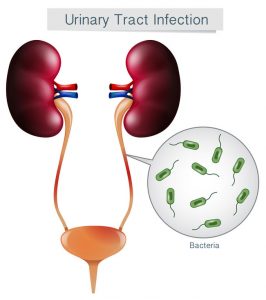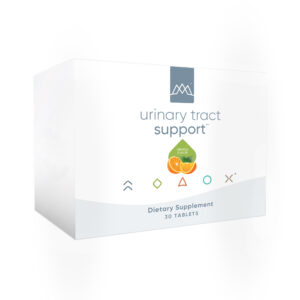What is a UTI?
 A UTI (urinary tract infection) is an infection in any part of your urinary system. While bladder infections are the most common type, a UTI can develop in any part of your urinary tract including your urethra, ureters, or kidneys. (1)
A UTI (urinary tract infection) is an infection in any part of your urinary system. While bladder infections are the most common type, a UTI can develop in any part of your urinary tract including your urethra, ureters, or kidneys. (1)
Over eight million people visit healthcare practitioners every year for UTIs. (2) Many occur from bacteria from the bowel. Fungi and viruses can also create these infections. Two strains of bacteria — Escherichia coli or E. coli and Staphylococcus saprophyticus — create about 80% of UTIs. (3)
These bacteria can go from the anus to the urethra, traveling up to your bladder and eventually the kidneys. Women have shorter urethras, allowing bacteria to more quickly invade the bladder. (4)
This explains why women are more likely to get a UTI. Some experts believe one in two women will get UTIs during their lifetime, and some will have repeated UTIs that sometimes last for years. (5) Especially for younger men, UTIs are rare but do increase with age. (6)
Symptoms of a UTI
UTIs aren’t always obvious, but they can be painful. (7) Signs include:
- A strong, persistent urge to urinate
- A burning sensation when you urinate
- Passing frequent, small amounts of urine
- Cloudy or red-colored urine
- Strong-smelling urine
- Pelvic pain in women (8)
Most UTIs can be treated within two to three days. (9) Your healthcare practitioner will take a urine sample to see if it contains UTI-causing bacteria. He or she may prescribe antibiotics to kill the intruders. (10)
However, some experts believe antibiotics are overprescribed for UTIs, potentially increasing the problem. (11) Talk with your healthcare practitioner about potential alternatives to antibiotics. Never discontinue any medication without his or her consent.
How to Prevent a UTI
 The best way to avoid UTIs is to prevent them in the first place. You can reduce your chances of getting a UTI and maintain
The best way to avoid UTIs is to prevent them in the first place. You can reduce your chances of getting a UTI and maintain
with these five strategies.
- Eat the right foods. Foods from our Core or Advanced Plans are great and focus on these targeted foods:
- Berries, especially cranberries and blueberries, can keep bacteria from attaching to your urinary tract lining. (12) They also contain a naturally occurring sugar — called D-mannose — that attaches to E. coli and prevents these bacteria from sticking together and to your urinary tract walls. (13)
- Probiotic-rich foods including kimchi and sauerkraut. (14)
- Vitamin C-rich foods can make your urine more acidic and prevent bacteria from growing. (15) One study found that just 100 mg of vitamin C could significantly lower UTI infections. (16) Leafy greens, cruciferous greens, and berries are smart vitamin C sources.
- The acetic acid in apple cider vinegar can potentially reduce infection-causing bacteria like E. coli. (17)
- Drink plenty of filtered water. Urinating frequently helps flush out the bad bacteria. (18)
 Take a probiotic. Bacterial imbalances can increase the risk of bad bacteria, including E. coli. Talk with your healthcare practitioner about taking a probiotic supplement such as MaxLiving’s Probiotic 50b, especially after antibiotics treatment. (19)
Take a probiotic. Bacterial imbalances can increase the risk of bad bacteria, including E. coli. Talk with your healthcare practitioner about taking a probiotic supplement such as MaxLiving’s Probiotic 50b, especially after antibiotics treatment. (19)- Practice good hygiene.
- Empty your bladder as soon as you feel the need to go.
- Wipe from front to back.
- Shower rather than bathe.
- Keep your genital area dry with loose-fitting clothing and cotton underwear.
- Avoid scented products like douches and bath products that can increase irritation. (20)
- Consider a supplement. Concentrated amounts of specific nutrients can optimize your body’s ability to fight UTIs and keep them at bay. (21)
MaxLiving Urinary Tract Support
 MaxLiving Urinary Tract Support is a comprehensive supplement that delivers a blend of cranberry concentrate and D-mannose to provide all around support for the urinary tract. Cranberry is one of the most widely known fruits for optimal urinary tract health and the prevention of infection, and D-mannose and apple cider vinegar both have been shown to have a powerful effect. The combination of all three provides excellent support and protection from harmful bacteria.
MaxLiving Urinary Tract Support is a comprehensive supplement that delivers a blend of cranberry concentrate and D-mannose to provide all around support for the urinary tract. Cranberry is one of the most widely known fruits for optimal urinary tract health and the prevention of infection, and D-mannose and apple cider vinegar both have been shown to have a powerful effect. The combination of all three provides excellent support and protection from harmful bacteria.
MaxLiving Urinary Tract Support is ideal for patients looking to:
- Protect against UTI development.(22)
- Support optimal urinary tract health.(23)
- Help prevent bacteria growth in the urinary tract.(24)
In close, to minimize or eliminate your risk of UTIs, you’ll want to keep harmful bacteria out of your system. Always discuss any symptoms of UTIs — including burning and frequent urination — with your healthcare practitioner. (25)
![]()
![]()
About the Author
 Jason Boehm is a Chicago, IL-based nutritionist and science writer. He combines his two Master’s Degrees in Mass Communication and Nutrition to help others achieve their wellness goals through science-based, engaging written content.
Jason Boehm is a Chicago, IL-based nutritionist and science writer. He combines his two Master’s Degrees in Mass Communication and Nutrition to help others achieve their wellness goals through science-based, engaging written content.


